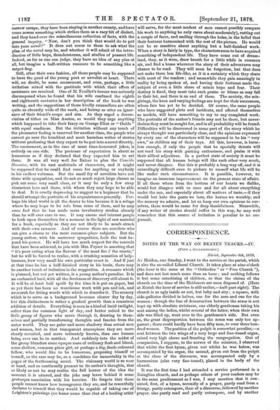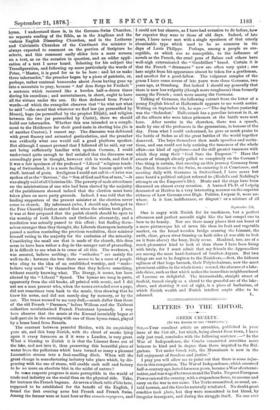CORRESPONDENCE.
Zitrich, September 6th, 1878. AT Heiden, one Sunday, I went to the service at the parish, which is also the so-called Liberal Church. It takes place at nine o'clock (the hour is the same at the " Orthodox " or " Free Church "), and does not last much more than an hour ; and nothing follows it but some catechising of children, so that the claims of the church on the time of the Heideners are soon disposed of. (Here at Zurich the hour of service is still earlier,—half-past eight). The church is as ugly inside as out, but lofty and airy ; a square, with side-galleries divided in halves, one for the men and one for the women ; though the line of demarcation between the sexes is not kept up with absolute strictness, one elderly gentleman taking his seat among the ladies, whilst several of the latter, when their own side was filled up, went over to the gentlemen's side. But even so, the great disproportion between the sexes was only too ap- parent ; there could hardly have been fifty men, to over three hun- dred women. The position of the pulpit is somewhat peculiar,—a seat between the two wings of a very large and fine-toned organ, raised very high above and fronting the congregation. Out of compassion, I suppose, to the nerves of the minister, I observed that whilst the first hymn, given out whilst he was below, was accompanied by the organ, the second, given out from the pulpit at the close of the discourse, was accompanied only by a harmonium (also very fine-toned), placed in the body of the church.
It was the first time I had attended a service performed in a Zuinglian church, and as perhaps others of your readers may be in the same predicament as I was, I may mention that it con- sisted, first, of a hymn, secondly of a prayer, partly read from a liturgy, partly extempore, then of a discourse, followed by another prayer, also partly read and partly extempore, and by another hymn. I understand there is, in the German-Swiss Churches, no separate reading of the Bible, as in the Anglican and the various English Dissenting Churches, and in the Lutheran and Calvinistic Churches of the Continent the minister is always expected to comment on the portion of Scripture he selects, and this comment easily slides into a mere sermon on a text, as on the occasion in question, and an odder appli- cation of a text I never heard. Selecting for his subject the Transfiguration, and following up more particularly the words of Peter, " Master, it is good for us to be here : and let us make three tabernacles," the preacher began by a piece of patriotic, or, perhaps, rather cantonal buncombe about Jesus having gone up into a mountain to pray, because " Auf dem Berge ist Freiheit " a sentence which recurred like a burden half-a-dozen times during his exordium ; and mountaineers, in short, ought to have all the virtues under the sun. He then deduced from Peter's words—of which the evangelist observes that " he wist not what he said "—the moral that wherever we find law (as personified by Moses), hope (as personified by the prophet Elijah), and religion between the two (as personified by Christ), there we should build our tabernacles. Whether this was intended as a compli- ment to the Heideners for their good-taste in electing him (he is of another Canton), I cannot say. The discourse was delivered with great fluency and animated gesticulation, and the preacher was evidently what one would call a good platform speaker. But although I cannot pretend that I followed all be said, my ear not being sufficiently familiar with spoken German, I could understand quite enough to feel satisfied that the discourse was exceedingly poor in thought, however rich in words, and that if it was a fair specimen of the professed " Liberal " religious teach- ing of Switzerland, it is a mere feeding of the human spirit with chaff, instead of grain. Irreligious I could not call it—Christ was spoken of as the" Saviour," the " Son of God and Son of man,"—it was simply void of all Christian life. The poverty of male attendance on the ministrations of one who had been elected by the majority of the parishioners showed indeed that the election must have taken place on mere party grounds. Indeed, I was told that the leading supporters of the present minister at the election never come to church. My informant (who, I should say, belonged to the Free Church) further stated that when the schism took place, it was at first proposed that the parish church should be open to the worship of both Liberals and Orthodox alternately, and a resolution was actually passed to this effect ; but finding them- selves stronger than they thought, the Liberals thereupon instantly passed a motion rescinding the previous resolution, their minister himself voting in the majority for the exclusion of the minority. Considering the small use that is made of the church, this does seem to have been rather a dog-in-the-manger sort of proceeding. It is difficult to see what is to come of all this. The workmen, I was assured, believe nothing ; the " orthodox " are mainly the well-to-do ; between the two there seems to be a mass of people who cling to the idea of an established worship, and " make- believe very much " to themselves that they believe something, without exactly knowing what. The liturgy, it seems, has been altered by the " Liberal " Synod. The hymns are sung in parts, apparently from the old books, all printed with music, and I did not see a man present who, when the verses extended over a page, did not sometimes turn back to the music, thus showing that he knew his notes, and did not merely sing by memory, or by the ear. The tunes seemed to me very dull,—much duller than those of the old French " Psaumes," before Wilbem and the Taitbout collection revolutionised French Protestant hymnody. I may here observe that the music at the Kursaal invariably began at half-past six in the morning with one of these hymn-tunes, played by a brass band from Bavaria.
The contrast between peaceful Heiden, with its exquisitely pure air, and this busy ZUrich, with the cloud of smoke lying upon it every forenoon as if it were a London, is very great. What a blessing to Zurich it is that the Limmat flows out of the lake, and not into it, thus preserving this beautiful piece of water from the pollutions which have turned so many a pleasant Lancashire stream into a foul-smelling ditch. When will the great change in manufacturing industry take place which, by dis- pensing with the use of steam, will enable each mill and factory to be no more an absolute blot in the midst of nature ?
In sone respects progress is more perceptible in the world of trade and industry on the social than on the physical side. Take, for instance the French bagman. At seven o'clock table ethote here, supposed to be established for the benefit of the English, I found the first evening none but French and French Swiss. Among the former were at least four or five commis-voyageurs, and
I could not but observe, as I have had occasion to do before, how far superior they were to those of old days. Indeed, of late years, I have never met with a single specimen of that utterly abominable type which used to be so common in the days of Louis Philippe. Perhaps, among a people so sus- ceptible, or which was so susceptible, to the influence of novels as the French, the cruel pens of Balzac and others have well-nigh exterminated the " Gaudrillart " breed. Certain it is that the French " drummers " now are often very quiet ; one here might from his appearance almost be taken for a gentleman, and another for a good-fellow. The vulgarest samples of the genus I have come across of late years were three Germans, two years ago, at Strasburg. But indeed 1 should say generally that there is now less vulgarity (though more roughness) than formerly among the French ; much more among the Germans.
Talking of Germans, the following extract from the letter of a young English friend at Halberstadt appears to me worth notice. Writing on September 4th, he says :—" The day before yesterday was the ' Sedanfest.' Halberstadt has a peculiar interest in it, as all the officers who were taken prisoners at the battle were sent here. After service in the churches, there was a speech, made by one of the professors in the gymnasium, in honour of the day. From what I could understand, he gave as much praise to the battle of Sedan as all the great battles of the world together deserved. The boys themselves then made speeches and recita- tions, and one could not help noticing the tameness of the whole affair—no kind of applause—and the still greater tameness with which they sang their God Save the Emperor.' " Have the sweets of triumph already palled so completely on the German ? One thing is certain, that crossing on this journey Germany from the Dutch frontier to the Swiss, re-entering it at Constance, and meeting daily with Germans in Switzerland, I have never but once heard a political subject referred to (Hodel's and Nobiling's attempts on the Emperor's life). Music and the stage have been discussed on almost every occasion. A learned Ph.D. of Leipzig descanted at Heiden in a very interesting manner on the superior richness of Low German over High. Politics, I repeat it, were no- where. Is it fear, indifference, or disgust ? or a mixture of all three?
• September 7th.
One is angry with Zurich for its smokiness, but a perfect afternoon and perfect moonlit night like the last compel one to bow to its beauty. Nor are there many places that can boast of a more picturesque bit of town life than its fruit and vegetable market, on the broad wooden bridge crossing the Limmat, the swift, clear, green river framing on both sides (I was able to look on it from above) the busy, lively scene. _Mankind, too, are of a much pleasanter kind to look at than those I have been living with lately, for I must admit that my friends the Appenzellers are among the most hard-featured of brother-Aryans. But two things are not to be forgiven to the Ziirichers,—first, the hideous ugliness of that huge barrack, their Polytechnicum, now the most prominent edifice in the whole town ; second, the absence of a lake- side drive, such as that which makes the immediate neighbourhood of Lucerne so delightful. The interminable, straight street of Seefeld, traced simply as a chord to the graceful arc of the lake- shore, and shutting it out of sight, is a piece of barbarism, of which Zurich wealth and Zurich intellect ought alike to be































 Previous page
Previous page